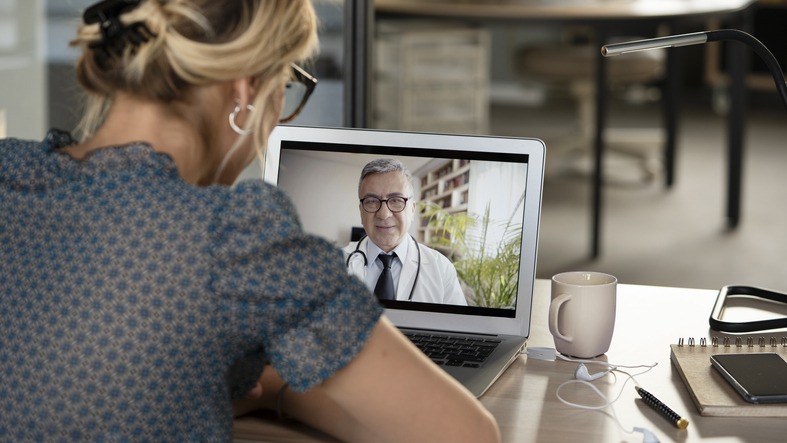
As reported by The Telegraph, GPs are failing to give patients face-to-face appointments despite repeated NHS and government commitments, research has found
Polling shows one in six say they do not provide in-person appointments to all who seek them, with many saying that the doctor knows best about whether a meeting is necessary.
Before the pandemic, around 80% of GP appointments across England took place in person. This dropped to less than half during the first lockdown, as doctors instituted a system of “total triage” to deal with far more cases remotely.
After The Telegraph highlighted the issue in 2021, NHS England immediately reversed its guidance, saying all patients had the right to choose a face-to-face appointment.
However, the proportion of face-to-face cases has remained significantly lower than before the pandemic, now averaging 69% across England after repeated government interventions. In some parts of Hampshire, Cambridgeshire and Greater Manchester less than 20% of appointments take place in person.
Patients’ groups said the situation was “totally unacceptable” with many people unable to “fight their corner” and insist on their right to see a doctor.
Dennis Reed, director of Silver Voices, a campaign group for the elderly, said: “GP practices are making a conscious effort to direct people away from seeing their doctor, in many cases refusing to see them face-to-face, or putting pressure on patients to accept a phone consultation. “Many elderly people struggle to fight their corner so often they end up having to accept a phone consultation, even though it isn’t what they wanted.”
He added: “These findings show exactly what our members are telling us: the right to see a GP in person is not being enforced at all. The situation is totally unacceptable.”
The survey of almost 900 GPs by Pulse magazine shows 58% of family doctors said they were offering in-person appointments to those requesting them, with similar times to a phone consultation.
A further 22% said those insisting on seeing their doctor in the flesh could expect to wait longer. And 16% said they could not provide face-to-face appointments for all who request them.
NHS guidance says every GP practice must “respect preferences for face-to-face care unless there are good clinical reasons to the contrary,” such as the presence of infectious disease.
But family doctors said they took their own decisions about whether their patients needed to see them.
All the GPs refusing patients face-to-face appointments chose to remain anonymous.
One respondent to the survey said: “Patients have remained patient with the service limitations. Small proportion do complain about access.”
Another said: “We decide who gets face-to-face and remote, offering choice if it doesn’t make a difference.”
“We do not provide face-to-face on demand: triaging GP has final say,” another added.
One doctor said their practice had the capacity to provide in-person appointments to all who sought them, but chose to triage requests.
Another said: “We just can’t meet demand,” with 77% of those polled by Pulse saying they had seen an increase in demands for face-to-face appointments over the last year.
“We don’t have enough capacity as it is,” another GP said.
Some GPs said they tried to “persuade” patients to take telephone or online appointments if they felt it was more appropriate, and said frequent attenders were not allowed face-to-face slots without a good clinical reason.
“Not all requests are appropriate, and some can be more efficiently directed, or advised on infection risk and more appropriate management,” one said.
Several family doctors said GPs were simply unable to cope with demand.
Latest figures show 29.3m practice appointments carried out in June, 69% of which were face-to-face. In total, 47% of all practice appointments were carried out by GPs.
This compares with 22.8m appointments in June 2019, 81% of which were face to face, with 53% of appointments involving GPs.
Dr Zishan Syed, a GP in Kent, said: “There are not infinite resources for general practice.”
He suggested patients were more likely to get a face to face appointments with their GP than with many hospital departments.
Dr John Sharvill, a former GP partner in Kent, told Pulse that he “hates” video or phone consultations – saying he could not feel confident reviewing a child with a temperature or person without abdominal pain without physically seeing them.
The medic, who has continued working in urgent care, said: “There was a time when uncertainty was dealt with by personal review, but now it is a case of joining 111 or an A&E queue rather than seeing people. The time it takes me to so a full video consult (consultation) after preparing the equipment, I could have seen the person.”
In September 2021 then Prime Minister Boris Johnson intervened on the issue, saying all patients were entitled to see their GP in the flesh.
Mr Johnson said people should be able to have “the security and confidence that they will be treated in person by a GP who can have proper hands-on understanding of the problem they have got”.
Professor Kamila Hawthorne, chairman of the Royal College of GPs, said: “Safe, timely and appropriate care can be delivered both in person and remotely. We know some patients prefer seeing their GP face to face, and many GPs prefer this way of consulting, but some patients find remote care a convenient and effective way of accessing GP services.”
A Department for Health and Social Care spokesperson said: “NHS England guidance and our Primary Care Recovery Plan clearly state general practices must respect a patient’s preference for a face-to-face appointment, unless there are good clinical reasons not to. “There are more than 2,000 additional doctors in general practice compared to June 2019,” he added.
An NHS spokesman said: “Every GP practice must offer face to face as well as telephone and online appointments, and patient preference must be considered alongside clinical need, with almost seven in ten appointments being delivered face to face.”



Be the first to comment